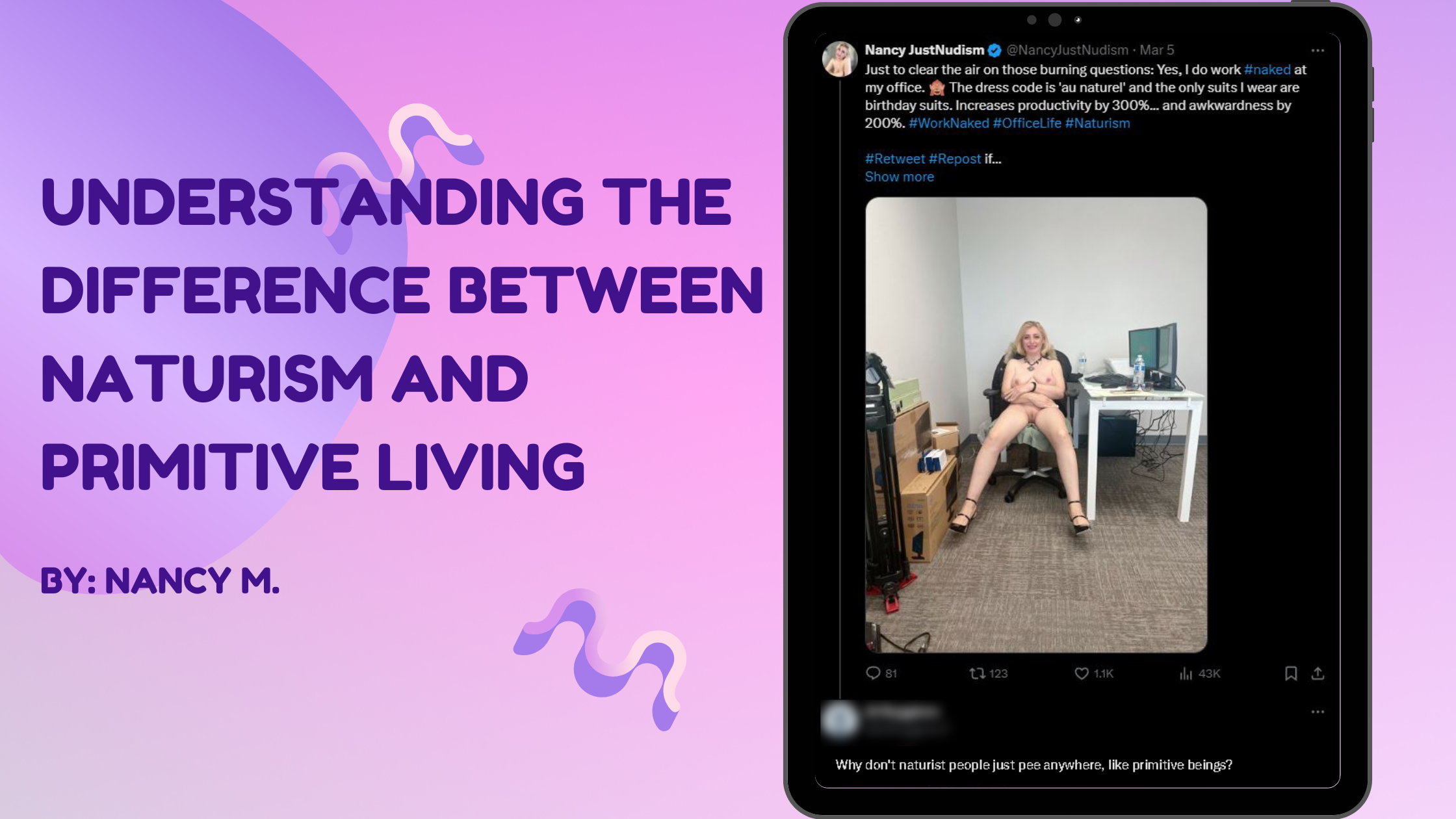The spark of inspiration for this blog post ignited from a tantalizing comment that landed in my Twitter feed. A curious follower boldly posed a provocative question: “Why don’t naturist people just pee anywhere, like primitive beings?” This seemingly innocent remark triggered a whirlwind of thoughts and urged me to plunge into the depths of misconceptions and realities surrounding naturism. As I delved deeper, it became apparent that there was a pressing need to unravel and dissect the subtle distinctions between embracing a naturist lifestyle and the primitive way of living.

And so, my dear nudie friends, let us embark on this topic together. Let us dive into the rich and complex world of naturism, where the senses are heightened, the characters are intriguing, and the emotions run deep. Let us embrace a voice that is as vibrant and diverse as the naturist community itself. Are you ready? Then let us begin.
Naturism, which is often associated with nudism, is a lifestyle centered on personal, family, and social nudity, which is practiced for many reasons such as health, relaxation, or personal belief. It is not a call for a return to a primitive life for several reasons:
Philosophical and Ethical Beliefs:
Naturism, often misunderstood, is much more than simply shedding one’s clothes. It is a philosophy deeply ingrained in the principles of freedom, equality, and respect. At its core, naturism advocates for the acceptance of the human body in its natural, unadorned state. This acceptance goes beyond mere tolerance, striving to cultivate a sense of self-respect and a respectful acknowledgment of others, regardless of their physical attributes. The movement encourages individuals to view the body as normal and natural, rather than an object of sexualization or shame.
The ethos of naturism is not about renouncing the comforts and advances of modern life. Instead, it challenges us to rethink our relationship with our own bodies and those of others within the context of these advancements. It posits that one can embrace technology, culture, and societal progress while also advocating for a more natural and less inhibited experience of human existence. This dual embrace demonstrates that naturism is not a regressive concept but a progressive one, advocating for an integration of natural human experiences with contemporary life.
On top of that, naturism promotes a lifestyle where equality prevails. In a naturist setting, the social hierarchies and status symbols that often divide us in clothed society, such as fashion brands, jewelry, or even the type of phone one uses, lose their significance. Without these markers, individuals interact as equals, fostering an environment where respect for the individual is paramount, and judgments based on appearance are minimized.
Naturists also embrace a more open-minded view of human nature, recognizing the beauty and diversity of the human form in all its shapes and sizes. This perspective encourages a healthier body image and self-esteem, as it diminishes the often unattainable standards set by media and societal expectations.
Modern Practice:
While it involves nudity, naturism is practiced within the context of contemporary society. Naturists use modern amenities, engage in social activities, and often organize events in designated areas like private clubs, beaches, or resorts. The lifestyle is integrated with current social norms and legal frameworks, ensuring it is a choice rather than a necessity driven by primitive living conditions.

Naturism, as a modern practice, seamlessly intertwines the simplicity of nudity with the complexities of contemporary life. It is a lifestyle choice that reflects a conscious decision to embrace nudity as part of daily living, without discarding the conveniences and advancements of modern society. Naturists are not only advocates for experiencing life in a more natural state but also participants in the global community, utilizing modern amenities such as technology, transportation, and healthcare.
Engagement in social activities is a cornerstone of naturist life. Naturists come together in various settings, from private clubs and secluded beaches to specialized resorts, creating communities where individuals can enjoy recreational activities, socialize, and relax in a clothing-optional environment. These spaces provide a safe and controlled environment where the spirit of naturism (respect for oneself and others) can thrive.
By the same token, the organization of events in these designated areas often mirrors that of any mainstream social gathering, albeit without clothing. Activities can range from sports and yoga to art classes and culinary events, highlighting that the naturist lifestyle is not about abandoning societal norms but rather experiencing them without the societal construct of clothing.
The integration of naturism with current social norms and legal frameworks is crucial. It underscores that naturism is a legitimate lifestyle choice, governed by laws and regulations that ensure it is practiced respectfully and appropriately. This legal recognition helps dispel the notion that naturism is akin to primitive living. Instead, it emphasizes that naturists are part of the broader society, adhering to its legal and ethical standards.
In essence, modern naturism represents a balanced integration of natural human experiences with the societal, legal, and technological advances of contemporary life. It offers an alternative way of living that values freedom, equality, and respect, all while maintaining the benefits and responsibilities of modern civilization. Naturists demonstrate that it is possible to live a life that is both naturally unencumbered and socially responsible, embracing the advancements of the modern world without losing the connection to the natural self.
Health and Well-being:
Many naturists argue that their lifestyle promotes physical and mental health benefits, such as improved body image, reduced stress, and a stronger connection with nature. These benefits are sought within the framework of modern understanding of health and wellness, incorporating advances in medical science and psychology.
The health and well-being benefits associated with naturism are grounded in a comprehensive understanding of human physiology and psychology. Many naturists attest to experiencing significant physical and mental health improvements, advocating that this lifestyle can lead to a more harmonious and balanced state of well-being.
- Improved Body Image: Naturism encourages the acceptance of one’s body, with all its perceived imperfections, fostering a positive body image. In a naturist environment, individuals are exposed to a diverse range of body types, which can help normalize natural body variations and diminish feelings of inadequacy or self-consciousness often exacerbated by media portrayals of ‘ideal’ bodies. This exposure can lead to increased self-esteem and a more accepting attitude towards oneself and others.
- Reduced Stress: The practice of naturism is often associated with a reduction in stress levels. Being in a natural state, free from the constraints of clothing, can provide a sense of liberation and simplicity, offering a mental break from the daily stresses and demands of modern life. The naturist setting, often in nature or tranquil environments, further contributes to stress reduction, providing a peaceful retreat from the urban hustle.
- Stronger Connection with Nature: Naturism allows for a direct physical connection with the natural environment, which can be deeply therapeutic. Skin-to-nature contact, such as walking barefoot on the grass or swimming in a natural body of water, can enhance one’s sense of being part of the larger ecosystem. This connection can lead to a greater appreciation for the environment and a heightened awareness of the importance of its conservation.
These health and well-being benefits are not just anecdotal; they are increasingly recognized in scientific studies. Research in areas like environmental psychology and health science suggests that activities promoting body acceptance and exposure to nature can have tangible health benefits, including improved mental health, reduced cortisol levels (a stress marker), and enhanced immune system functioning.
Yet, the naturist lifestyle’s emphasis on community and social interaction can contribute to emotional well-being. Social nudity can reduce barriers and foster a sense of equality and openness among individuals, leading to deeper social connections and a supportive community environment.
Community and Socialization:
Naturism fosters a sense of community and belonging among its practitioners, who gather and socialize in a non-sexual, natural state. This social aspect is a far cry from a call to primitive life; rather, it’s an alternative approach to social interaction that emphasizes equality and acceptance.
The community and socialization aspect of naturism plays a vital role in its appeal and sustainability as a lifestyle. Naturism creates unique spaces where individuals can come together and interact in a state of naturalness and authenticity, which often leads to strong communal bonds and a profound sense of belonging.
- Fostering Equality and Acceptance: In a naturist setting, the usual markers of social status and wealth, such as clothing, accessories, and other material possessions, are absent, helping to diminish social hierarchies. This lack of material indicators promotes an environment where individuals are valued for who they are, rather than what they own or wear. Such an environment nurtures mutual respect and acceptance, as all participants are seen as equals, fostering a community spirit grounded in shared values and experiences.
- Enhanced Social Interaction: Naturist communities often report a higher degree of open and honest communication among their members. The absence of clothing is said to reduce barriers and pretenses, encouraging more genuine and meaningful interactions. This level of transparency can lead to deeper relationships and a stronger communal bond, enhancing the social fabric of the naturist community.
- Diverse and Inclusive Communities: Naturism attracts individuals from various backgrounds, creating diverse and inclusive communities. These communities are united by a common interest in naturism, but their diversity adds to the richness of the social experience, offering opportunities for learning, growth, and cultural exchange.
- Non-Sexualized Environment: It’s important to emphasize that socialization in naturist communities occurs in a non-sexual context. Naturism advocates for the normalization of the human body as non-sexual outside specific contexts, helping to separate nudity from sexuality in social settings. This distinction is crucial for creating a comfortable and respectful environment for all participants, including families and individuals of all ages.
- Community Activities and Events: Naturist communities often organize a variety of activities and events, from beach clean-ups and nature hikes to art shows and educational workshops. These activities not only provide opportunities for social interaction but also help to reinforce the community’s values, such as environmental stewardship, health, and personal growth.
The question that sparked this exploration into naturism and primitivity reveals a common misconception about both concepts, highlighting a lack of understanding of their true nature and implications. Primitivity, often associated with pre-civilizational or early human societies, does not inherently involve a conscious choice to be naked. For primitive people, nudity was a natural state, devoid of the cultural and social meanings it carries today. They were naked for practical reasons related to their environment and lifestyle needs, not out of a philosophical or lifestyle choice. Their lack of clothing was not a statement or an ideology but a simple fact of their existence, often dictated by the climate, activities, or absence of available materials for clothing.
We are always in need for your support, Please sign up here and join us!
Share this blog:




Get involved!
Comments
Human beings will thus evolve over centuries, millennia with choices, experiments of all kinds, inventing communities, hierarchies between them, rare and therefore expensive objects to differentiate themselves, to impose themselves. It was only in the last century that the invention of Naturism, in other words trying life without the constraint of clothing, a more natural life. This was going to lead to conflicts between those for and against, so nothing simple. The inter-relational effects are numerous, important on all levels between individuals and on society itself. Evolution is underway, what will it be in 10 years, 20 years, or even more? We will find out.